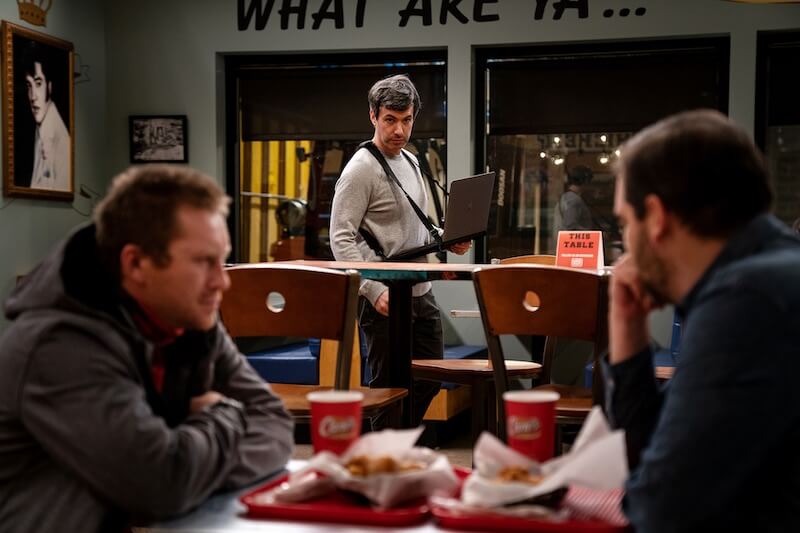In Nathan Fielder’s big-budget reality TV outing for HBO, the socially awkward mastermind helps a cast of eccentrics as they navigate life’s uncertainties. One man wants to confess a dirty secret to his friend: He’s actually been lying about having a graduate degree since they met. Another woman is considering having a child—but wants to know exactly what the experience will feel like before she fully commits.
For most people, having to deal with such difficult conversations (or Major Life Events) involves an amount of risk. It’s impossible to know how certain scenarios will play out, or what the future will bring. Or… is it?

Enter Nathan Fielder, who’s willing to go to absurd lengths to let strangers “rehearse” what they’re anxious about. This involves plenty of role play (many, many actors are hired) and set construction (the man lying about his graduate degree wants to spill his beans during a trivia night at Brooklyn’s Alligator Lounge, so Fielder has a 1:1 replica of the bar built in an empty warehouse).
Not everyone can stomach this show. Richard Brody, writing in the New Yorker, lamented Fielder’s “cruel and arrogant gaze,” and obsession with “control” at the expense of all else. But beyond the cringe factor there’s something very moving, and also heartbreaking, about these attempts to bind life’s uncertainties—to pretend like we do actually have control over what comes next, and that we’re not just barely buckled in for a ride to who-knows-where.
Now, over here at Lemonade, we’ve got what you might call Insurance Brain. That’s a predilection for looking at all sorts of things, including pop culture, through our own nerdy lens. (Insurance is fucking awesome, and we’re not afraid to shout it from the rooftops.)
But in the case of The Rehearsal, it doesn’t seem like too much of a leap to argue that what Fielder is actually selling is a form of… insurance. His clients are scared of the future; they’re looking for peace of mind. At the very least, they want a little confidence, some padding against the risk and unpredictability of ordinary life.
And okay, insurance product lines aren’t this specialized. You can buy a policy that’ll help care for your dog if they break their leg, or one that’ll compensate you if your car is stolen or totaled in an accident. You can’t buy one that will smooth out every wrinkle and misstep.
Let’s break down a few possible cases with the same precision Fielder applies to mapping out a conversation between friends.
| Likely covered by some Lemonade insurance | Definitely not covered by our insurance |
|---|---|
| Medical expenses after a friend falls into your home’s “conversation pit” during a “Rehearsal” viewing party, resulting in a broken leg and wrist. | Emotional pain related to having to argue that your significant other isn’t a “gold digger,” thereby gaining you access to grandfather’s inheritance. |
| Possible compensation if your child’s Schwinn bicycle is stolen from the playground. | 100% guarantee that bringing a child into this world will prove to be a good decision in the first place, given all the hazards they’ll face—like Halloween, which is totally Satanic. |
| The cost of repairs, and possibly temporary accommodation, if a kitchen fire causes major damage to your house. | Rebuilding your shockingly detailed replica of an entire dive bar (including faux-pizza oven) if it were to be destroyed by a mob of angry Cheap Chick In The City stans. |
| Damages your car incurs after being rear-ended in the parking lot of Whole Foods. | Anxiety resulting from driving a long distance with a stoner who thinks the numbers on his speedometer are sending him a personal message from God. |
The Rehearsal is far from over, and it’s hard to predict where exactly it’ll go. But perhaps Fielder will realize that striving for complete control is always a fool’s game—a trick we play on ourselves.
Even the most astute actuary can’t crunch the intricacies of friendship, or fatherhood. The best we can do is prepare ourselves where possible—hey, insurance!—then take a deep breath, and hope for the best.